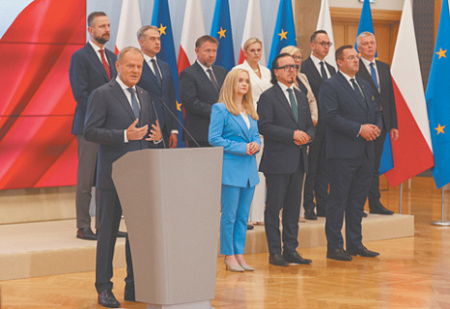
Polish Prime Minister Donald Tusk has unveiled a significant government reshuffle, declaring that his country is no longer in a post-war, but a “pre-war era.” The reorganization, announced on Wednesday, is designed to streamline the government and fortify it against what Tusk described as mounting contemporary threats, specifically citing the need to combat “aggressive actions by Russia and Belarus” and internal subversion.
In a move to create a more agile administration, the number of ministers has been reduced from 26 to 21. This restructuring includes the formation of two powerful “super-ministries,” one overseeing all economic matters and the other consolidating digitalization, education, and sports. While key figures like Finance Minister Andrzej Domański and Digitalization Minister Krzysztof Gawkowski retain their posts, several portfolios including Interior, Justice, and Agriculture will see new leadership.
Underscoring the government’s new priorities, Tusk has promoted Defense Minister Władysław Kosiniak-Kamysz and Foreign Minister Radosław Sikorski to the roles of Deputy Prime Ministers. Tusk explicitly linked Sikorski’s promotion to the necessity of managing Poland’s “complex relations with Ukraine” at a higher political level, signaling the strategic importance of the Eastern European partnership amid regional instability.
This government overhaul comes at a time of significant domestic political turbulence. The pro-European ruling coalition recently suffered a major blow with the presidential election victory of Karol Nawrocki, a nationalist from the opposition Law and Justice (PiS) party. Nawrocki has already taken a hardline stance, criticizing Ukraine’s bids for NATO and EU membership and raising contentious historical issues with Kyiv, threatening to veto any related accession documents.
While some analysts, including Bloomberg, connect the reshuffle to the coalition’s election defeat, Tusk had signaled his intent for a cabinet change as early as May. The move is also likely a response to plummeting public support. A recent CBOS poll showed that dissatisfaction with the government has hit a record 47%, while Tusk’s personal disapproval rating has surged to 58%, reflecting deep-seated public discontent.
Looking ahead, the Tusk government faces the prospect of significant political gridlock. Experts warn that President-elect Nawrocki, who takes office on August 6, is poised to systematically obstruct the cabinet’s agenda. He has threatened to use his presidential veto power on legislation, a move the ruling coalition lacks the required three-fifths parliamentary majority to override, potentially paralyzing the government.
Reinforcing the gravity of the situation, the Polish Foreign Ministry last week issued a stark advisory, urging its citizens to leave Russian territory. Citing Poland’s designation as an “unfriendly country” by Moscow and reduced consular capacity, the warning serves as a tangible manifestation of the escalating tensions that form the backdrop for Tusk’s “pre-war” footing.
